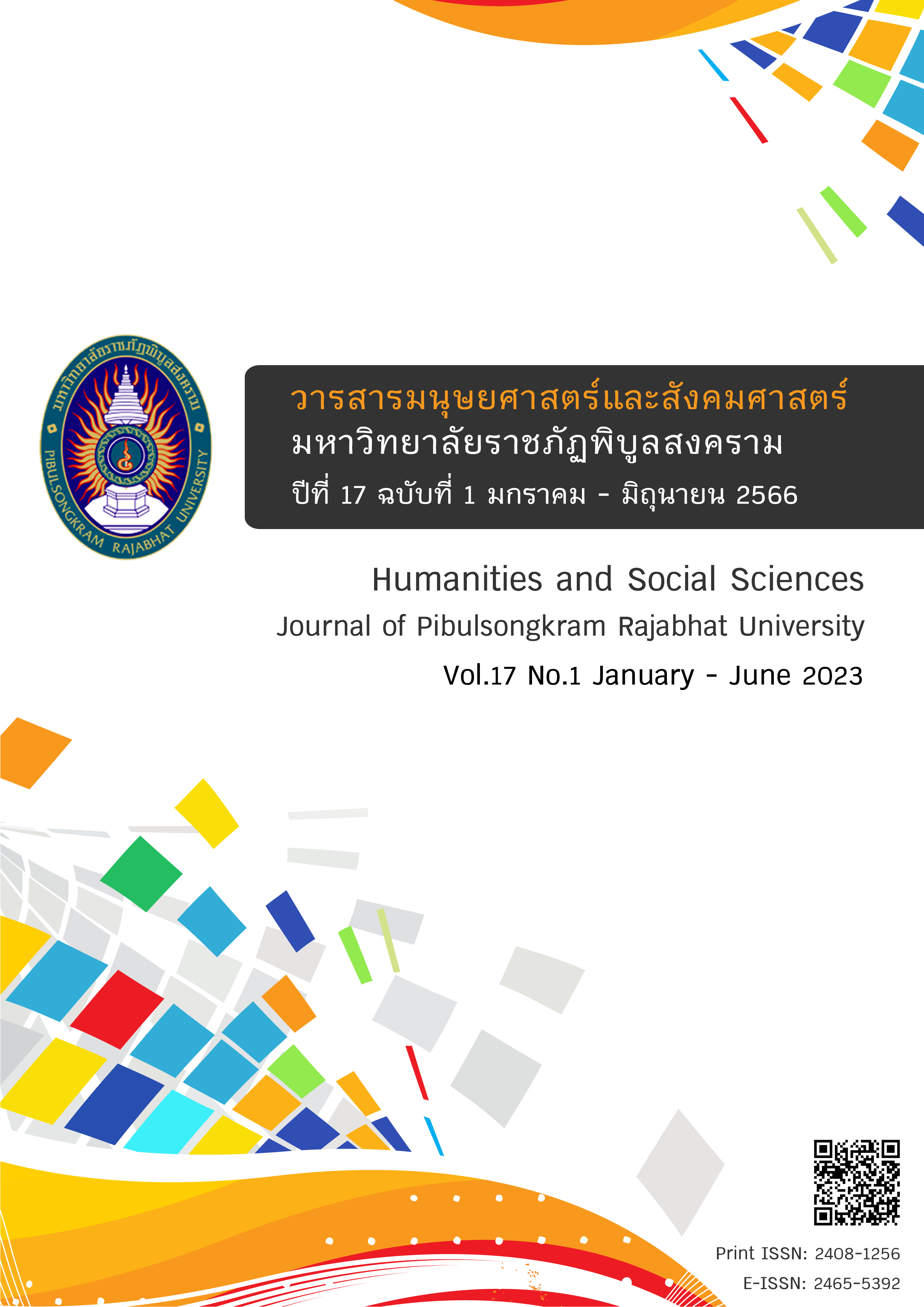The Priority Needs of Secondary Schools Academic Management Based on The Concept of Entrepreneurial Leadership Competencies
DOI:
https://doi.org/10.14456/psruhss.2023.29Keywords:
Academic Management, Secondary School, Competencies, Entrepreneurial LeadershipAbstract
The purpose of this research aimed to study the priority needs of secondary school academic management based on the concept of entrepreneurial leadership competencies. This research adopted a quantitative approach. The sample was 345 secondary schools under the supervision of the Office of the Basic Education Commission, selected through multi-stage random sampling. There were 799 key respondents including administrators, course supervisors and teachers. The research adopted the questionnaire method as an instrument for collecting data. The data were analyzed by considering the frequency, percentage, means, standard deviation, and PNImodified for investigating the priority needs of secondary school academic management based on the concept of entrepreneurial leadership competencies. Regarding the secondary school academic management, the results showed that the highest priority needs index was the Measurement and Evaluation (PNImodified = 0.201), Curriculum Development (PNImodified= 0.200), and the Learning and Co-curriculum Activities Management (PNImodified = 0.168) respectively. By considering each aspect of the secondary school academic management, the highest priority needs of 1) the Curriculum Development aspect was the Task-oriented Competencies for Innovativeness, while the highest priority needs of 2) the Learning and Co-curriculum Activities Management, 3) the Measurement and Evaluation, and 4) the Media, Innovation, Technology, and Learning Resources Development was the Scenario Enactment Competencies for encouraging Risk-Taking in the learner.
References
ปรียาพร วงศ์อนุตรโรจน์. (2553). การบริหารงานวิชาการ. กรุงเทพมหานคร: ศูนย์การพิมพ์กรุงเทพมหานคร.
ปองสิน วิเศษศิริ. (2555). เอกสารประกอบการสอนวิชา 2747732 การบริหารวิชาการกับการประกันคุณภาพ การศึกษา. กรุงเทพมหานคร: จุฬาลงกรณ์มหาวิทยาลัย.
สำนักงานเลขาธิการสภาการศึกษา. (2550). มาตรฐานการศึกษาของชาติ. กรุงเทพมหานคร: สํานักงานเลขาธิการสภาการศึกษา.
สำนักงานเลขาธิการสภาการศึกษา. (2561). การจัดการศึกษาเพื่อพัฒนาความเป็นผู้ประกอบการ. กรุงเทพมหานคร: บริษัท พริกหวานกราฟฟิค จำกัด.
สำนักงานเลขาธิการสภาการศึกษา. (2562). เข้าใจสมรรถนะอย่างง่ายๆ ฉบับประชาชน และเข้าใจ หลักสูตร ฐานสมรรถนะอย่างง่ายๆ ฉบับ ครู ผู้บริหาร และบุคลากรทางการศึกษา. กรุงเทพมหานคร: บริษัท 21 เซ็นจูรี่ จำกัด.
สำนักงานส่งเสริมสังคมแห่งการเรียนรู้และคุณภาพเยาวชน. (2555). ช๊อค “หลักสูตรการศึกษา” ไม่สอดคล้องอาชีพแห่งความเป็นจริง. สืบค้น 10 พฤศจิกายน 2562. จาก http://www.qlf.or.th/Mobile/Details?contentId=666
สำนักบริหารงานการมัธยมศึกษาตอนปลาย. (2560). มาตรฐานการปฏิบัติงานโรงเรียนมัธยมศึกษา พ.ศ.2560
(ปรับปรุง พ.ศ.2562). สืบค้น 23 เมษายน 2563, จาก https://secondary.obec.go.th.
สุเทพ ชิตยวงษ์. (2562). "สุเทพ"ลั่นต้องยกเครื่องกระบวนการวัดและประเมินผล กำจัดจุดอ่อนของการศึกษา ไทย. สืบค้น 9 มกราคม 2563. จาก https://www.thaipost.net/main/detail/45427
สุวิมล ว่องวาณิช. (2558). การวิจัยประเมินความต้องการจำเป็น. กรุงเทพมหานคร: สำนักพิมพ์แห่งจุฬาลงกรณ์มหาวิทยาลัย.
อมรรัตน์ ศรีพอ. (2561). กลยุทธ์การบริหารวิชาการโรงเรียนมัธยมศึกษาเอกชนตามแนวคิดทักษะความคิดริเริ่มสร้างสรรค์และทักษะการคิดเชิงนวัตกรรม (วิทยานิพนธ์ปริญญาดุษฎีบัณฑิต). กรุงเทพมหานคร: จุฬาลงกรณ์มหาวิทยาลัย.
Acs, Z., Szerb, L., & Loyd, A. (2018). Global Enterpreneurship Index. Washington, GEDI.
Bagheri, A., Lope Pihie, Z. A., & Krauss, S. E. (2013). Entrepreneurial leadership competencies among Malaysian niversity student entrepreneurial leaders. Asia Pacific Journal of Education, 33(4), 493-508.
Bagheri, A., & Pihie, Z. A. L. (2011). Entrepreneurial leadership: towards a model for learning and development. Human Resource Development International, 14(4), 447- 463.
Chen, M.H. (2007). “Entrepreneurial leadership and new ventures: Creativity in entrepreneurial teams”, Creativity and Innovation Management, 16(3), 239-249.
Esmer, Y., & Dayi, F. (2017). Entrepreneurial Leadership: a framework. journal of mehmet akif ersoy university economicd and administrative sciences faculty, 4(2), 112-124.
Greenberg, D., McKone-Sweet, K., & Wilson, H. J. (2011). The new entrepreneurial leader: Developing leaders who shape social and economic opportunity: Berrett-Koehler Publishers.
Gupta, V., MacMillan, I. C., & Surie, G. (2004). Entrepreneurial leadership: developing and measuring a cross-cultural construct. Journal of business venturing, 19(2), 241-260.
Harkins, A. M. (2008). Leapfrog principles and practices: Core components of education 3.0 and 4.0. Futures Research Quarterly draft VIII, 24 (1), 1-15.
Ngigi, S., McCormick, D., & Kamau, P. (2018). ENTREPRENEURIAL LEADERSHIP COMPETENCIES IN THE 21st CENTURY: AN EMPIRICAL ASSESSMENT. DBA Africa Management Review, 8(2).
Pittaway, L., & Cope, J. (2007). Simulating entrepreneurial learning: Integrating experiential and collaborative approaches to learning. Management Learning, 38, 211– 233.
Zijlstra, P. H. (2014). When is entrepreneurial leadership most effective. University of Twen.
Downloads
Published
How to Cite
Issue
Section
License
Copyright (c) 2021 Humanities and Social Sciences Journal of Pibulsongkram Rajabhat University

This work is licensed under a Creative Commons Attribution-NonCommercial-NoDerivatives 4.0 International License.
Any articles or comments appearing in the Journal of Humanities and Social Sciences, Rajabhat Phibulsongkram University, are the intellectual property of the authors, and do not necessarily reflect the views of the editorial board. Published articles are copyrighted by the Journal of Humanities and Social Sciences, Rajabhat Phibulsongkram University.









